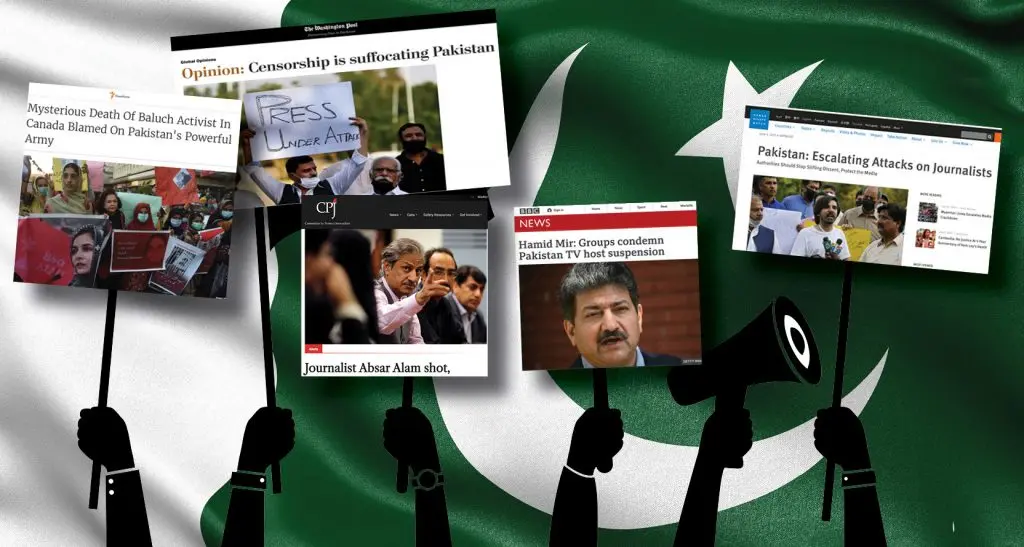
“Everyone has the right to freedom of opinion and expression; this right includes freedom to hold opinions without interference and to seek, receive and impart information and ideas through any media and regardless of frontiers.”
United Nations, Universal Declaration of Human Rights
A recent round of attacks has increased the pressure on our journalists. The silence with which journalists are attacked causes disaster in Pakistani democracy. Respect for journalists and their freedom of expression has declined to a new level in recent years. There is an active force to target them because of the important function they serve in keeping the general public informed. Around the globe, journalists are barred from revealing uncomfortable truths and holding leaders accountable for their actions in the eyes of the public, attracting governments’ violent efforts to discredit their work and sometimes silence them for life. Many daring and outspoken journalists live in continuous terror of attacks and fatal threats. Every day, there are numerous incidences of attacks against journalists in various areas of worldwide, many of which never make the news. Fear of violence hangs over journalists in many nations. That is why tales are swept under the carpet and unconstitutional actions are covered. This is a difficult time for journalism, especially in a country where it is so needed.
In the course of performing what they do professionally in Pakistan’s media atmosphere, our journalists confront tremendous dangers, hurdles, and threats to their safety like harassment, intimidation, assault, arbitrary arrest, imprisonment, abduction, and murder. A journalist has been harassed in a number of instances. Asad Ali Toor, a journalist, was assaulted by three unidentified men who forcibly entered his apartment in Islamabad, Hamid Mir, one of Pakistan’s best-known television talk show hosts after he spoke at a protest in solidarity with Asad was suspended, Prominent journalist Syed Talat Hussain banned, an unidentified assailant shot and wounded Absar Alam, a television journalist, outside his house in Islamabad, an unidentified assailant abducted Matiullah Jan, a journalist in Islamabad the day before he was to appear before the Supreme Court.
A group of prominent female journalists spoke out against an incident in which they were targeted on social media, including murder and rape threats against women journalists and analysts whose reporting was realistic and critical of the government. These cases disturbing to see the space for dissent and providing information of public importance rapidly shrink in Pakistan, with journalists as well as human rights defenders, particularly at risk of censorship. These kinds of threats have risen, and Pakistani authorities have increased their pressure on journalists and media owners to keep quiet critical voices. Governments have been pressuring our media outlets not to challenge government institutions. The majority of journalists in Khyber Pakhtunkhwa and Baluchistan have been more vulnerable to the elements than journalists in other parts of Pakistan. There are no checks and balances on security safety measures, poor conditions for the rule of law, and an absence of tolerance in society for press criticism among journalists. Pakistan’s democracy has come to an end.
In Pakistan, the right to freedom of expression and speech had been recognized by the Constitution of 1956 and 1962. The Constitution of Pakistan, 1973 includes a specific provision (Article 19) on freedom of expression and speech. Pakistan has freedom of Expression to hold opinions and free expression is fundamental for a thriving democracy. Article 19 of the United Nations Declaration of Human Rights (UDHR) also states, “Everyone has the right to freedom of opinion and expression.
If the Pakistani government and authorities are concerned about respecting their human rights obligations under Article 19 of the Pakistani constitution, they must take swift action to address censorship, harassment, and violence against journalists. They have to initiate timely, fair, and effective investigations into the current incidence of journalist attacks. In light of threats from extremist organizations and government officials, the government ought to eliminate official policies that protect the authorities from criticism and rather promote space for public debate and free speech. In Pakistan, the frequency and fearlessness with which journalists are attacked is alarming. The Pakistani government must hold those responsible for these attacks responsible and assure that all journalists may work without fear of intimidation or repercussions.
Samra Athar Kakakhel
Social Political Analyst & Human Rights defender



